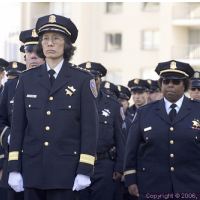Anti-White Police Hiring Case Goes to Trial in San Francisco
 San Francisco Police Chief Heather Fong (photo: Luke Thomas, Fog City Journal)
San Francisco Police Chief Heather Fong (photo: Luke Thomas, Fog City Journal)
A trial will be held this spring to let a jury decide if the San Francisco Police Department (SFPD)’s officer promotion process unlawfully favored black and Asian cops, federal Judge Claudia Wilken has ruled. White police lieutenants Heinz Hofmann and Thomas Buckley sued the City and County of San Francisco and two former SFPD chiefs in 2011, alleging civil rights and related claims. Both parties asked for a “summary judgment” in their favor, but Wilken determined that key factual issues will have to be decided by a jury.
According to Judge Wilken, in 2007 SFPD announced its intention to promote an undisclosed number of current officers to the rank of captain based on a multi-part written and oral examination, as well as certain “secondary criteria.” SFPD stated that for three years captain vacancies would be filled from a list of the top exam scorers called the “eligible list,” but that final decisions would be based as well on the secondary criteria, including an officer’s past “assignments, training, special qualifications, commendations/awards, bilingual certification, and discipline history.”
When it certified the exam results in January 2008, however, SFPD also unveiled a modified selection process called “banding” for use after the first eleven vacancies were filled. Banding treats exam scores that fall within a particular range or “band” as equivalent, regardless of their exact order. Quoting a 1992 federal case that approved of banding, Judge Wilken wrote that it “is premised on the belief that minor differences in test scores do not reliably predict differences in job performance” and, as such, “strict rank order promotions will not necessarily reflect the correct comparative abilities of the candidates.”
Buckley and Hofmann, who scored the 16th and 20th highest scores on the exam, were not eligible for the first eleven vacancies, and neither being promoted before the results expired in January 2011, they filed suit in August. Their complaint alleges that SFPD decided to use banding because it “felt a need to promote more blacks and Asians to Captain,” and that they “were objectively more qualified, based on secondary criteria, than any of the blacks or Asians promoted below them from the 2007 List.”
Although SFPD claims it switched to banding for non-discriminatory reasons, its failure to provide a specific explanation, coupled with its admission that the decision came after the exam results were in, according to Wilken, necessitate a trial because “the timing of the decision…is sufficient to raise an inference that it was motivated by a desire to increase the number of minority officers promoted.”
Ironically, SFPD may find itself between a rock and a hard place at trial, because not all considerations of race are unlawful.
Although adopting banding in order to boost the numbers of minority captains would be unlawful, doing so in order to avoid potential lawsuits by minority applicants alleging that the promotion process violated their civil rights would be lawful. Under a similar Supreme Court case involving firefighter promotions. The Court specifically observed that if “the City reviewed the exam results and then adopted banding to make the minority test scores appear higher, it would have violated Title VII’s prohibition of adjusting test results on the basis of race.” Ricci v. DeStefano (2009).
At trial, SFPD may also choose to highlight aspects of the plaintiffs’ service records to undercut their claims that they deserved promotions. Hofmann, for example, was reassigned from his post at the department’s tactical unit in 2005 after investigators discovered the unit’s fridge stocked with beer and hard liquor. Hoffman and Buckley’s attorney, Patrick Manshardt, told reporters in 2011 that he was “skeptical that had anything to do with the promotions.”
–Matt Bewig
To Learn More:
White Cops Head to Trial with Biased Testing Suit (by Megan Gallegos, Courthouse News Service)
White Male Cops Sue San Francisco, Citing Racial Bias (by Matt Smith, SF Weekly)
Hofmann and Buckley v. San Francisco (U.S. District Court for Northern District of California) (pdf)
Reverse Discrimination Case not What it Appears to be (by Matt Bewig, AllGov)
- Top Stories
- Controversies
- Where is the Money Going?
- California and the Nation
- Appointments and Resignations
- Unusual News
- Latest News
- California Forbids U.S. Immigration Agents from Pretending to be Police
- California Lawmakers Urged to Strip “Self-Dealing” Tax Board of Its Duties
- Big Oil’s Grip on California
- Santa Cruz Police See Homeland Security Betrayal in Use of Gang Roundup as Cover for Immigration Raid
- Oil Companies Face Deadline to Stop Polluting California Groundwater





